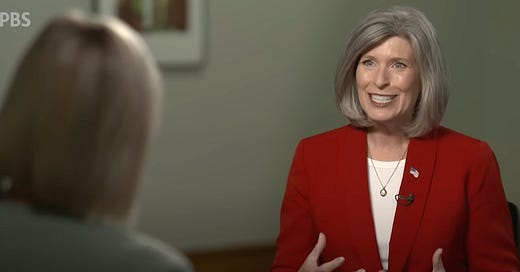
Republicans Add Opportunistic Infection To Coronavirus Relief Bill
That is a disease metaphor about a hidden provision to defund Planned Parenthood, maybe Medicaid.
Now that Mitch McConnell has had a good cry about how mean Democrats are being all partisan by not accepting a $425 billion no-strings giveaway to corporations in the Senate's economic stimulus bill, we learn that — surprise, surprise! — the nearly $2 trillion bill also has an evil little provision written into another part of the bill that appears to be aimed at defunding Planned Parenthood, but is so broadly written that it could endanger funding for any small nonprofit that receives funding through Medicaid.
The Washington Post explains what the Republicans who wrote the bill snuck into the portion that provides $350 billion to keep small business open if they don't lay off workers:
According to language in the bill forwarded to me by a senior Senate Democratic aide, this provision excludes "nonprofits receiving Medicaid expenditures," which would not be eligible for those loans.
This language has been interpreted in some quarters as an effort to deny funding to Planned Parenthood, a longtime GOP target. But Democratic aides think the language means a lot more than this.
Specifically, Democratic aides believe this language would exclude from eligibility for this financial assistance a big range of other nonprofits that get Medicaid funding, such as home and community-based disability providers; community-based nursing homes, mental health providers and health centers; group homes for the disabled; and even rape crisis centers.
Oh. And that's bad, right? Yes, it is.
This appears to be one of those things where you can't tell whether the bill's language was meant to only hurt Planned Parenthood and also — oops! — happens to exclude a bunch of other nonprofits, or if it was actually intended to limit funding for other nonprofits that use Medicaid funding to help poor people, because poor people don't deserve help. With the current crop of Republicans, the latter motivation seems entirely likely. And since the outcome is the same, the motive is irrelevant.
Mara Youdelman, an attorney with the National Health Law Program in Washington DC, told WaPo columnist Greg Sargent there's no two ways about it: Small nonprofits serve lots of people already, and during this pandemic, their services will be in even greater demand. Sargent notes that small nonprofits face particular challenges in a crisis like this:
While they get funding through patients who are on Medicaid and use it to pay for their services, Medicaid historically underpays for those services. With a surge in demand for such services amid the crisis, these providers will need more assistance — and if they're denied it, some could go out of business at the worst possible time, Youdelman noted.
"We should be doing everything possible to keep them in businesses, both to help manage the pandemic and to keep people needing routine care healthy and out of overwhelmed hospitals," Youdelman told me.
Sargent also thinks this particular example is useful in highlighting the differences between Republicans and Democrats in how the government should respond to the outbreak and its economic sequelae:
F rom the Democratic perspective, the coronavirus and the coming economic downturn will badly strain existing services and exacerbate a range of social problems — which tend to get worse in recessions — that make those services even more crucial.
For that reason, Dems see shoring up the safety net as just as important as getting people tested and treated — it's preventative medicine for the economy and the society.
Sargent doesn't offer a similar précis of the Republican outlook on dealing with the outbreak and the economic aftershocks, but perhaps he doesn't have to: It's survival of the fittest (plus cruise ships), with the fittest being chosen by Donald Trump's Treasury Department. Limiting the economic and social damage from the disease is simply not the government's business, even if, say, keeping group homes open has the benefit of not driving the residents' families into medical bankruptcy. They should have thought of that before letting Mom get old.
Or as some of the leading minds on the Right are suggesting, maybe we should just all go back to work and let those most vulnerable to COVID-19 hurry up and die, then, and reduce the surplus population:
Watch how this becomes the mainstream view on the Trump right https: //t.co/mkY8Vscwv0
— Rick Wilson (@Rick Wilson) 1584987958.0
Sargent also notes that the status of the economic stimulus bill is very much in flux today, and that Democratic leadership is trying to get this provision stripped out. He adds, perhaps a bit too optimistically, "if they hold a hard line, one hopes it will be tough for Republicans to allow it to remain."
One does hope that. But honestly, people with disabilities, and others who might lose essential services, are part of that portion of the economy that's "generally expensive to maintain," so perhaps Republicans will decide to hold firm on this insane part of the relief package. You can certainly imagine Tucker Carlson making the case that not everyone needs to make it through this.
It certainly wouldn't be the first time Republicans decided sacrificing services for the most vulnerable Americans was a small price to pay for claiming they're saving the little babbies. Just ask all the women in Texas whose maternal mortality rate doubled after the state eliminated all funding to Planned Parenthood.
[ WaPo ]
Yr Wonkette is supported entirely by reader donations! Help us keep the servers humming and the writers paid, and if you're sheltering in place, here's our Amazon linky , too.












And a guy in Arizona died, his wife seriously ill, after taking the Dr Stain's advice. They were probably drinking stuff that goes into fish tanks. They both got sick after about thirty minutes, and he died.
We're keeping our shit together. Some days are better than others.....Love to you.